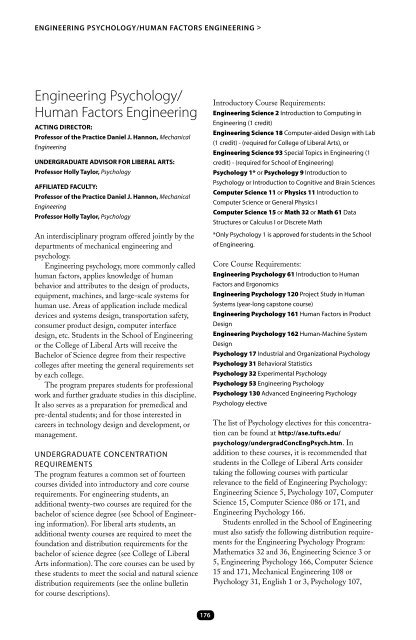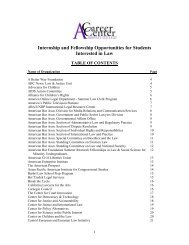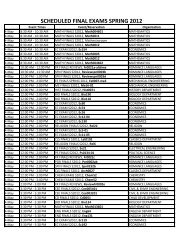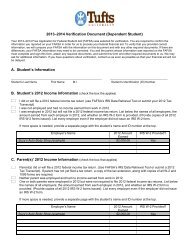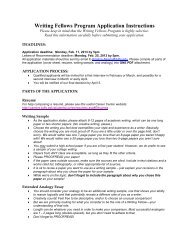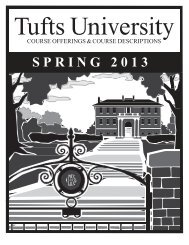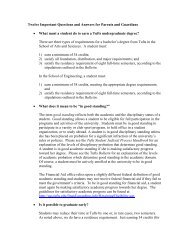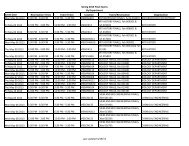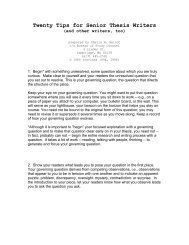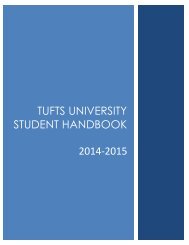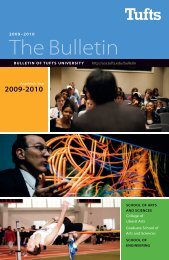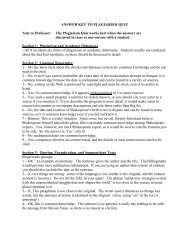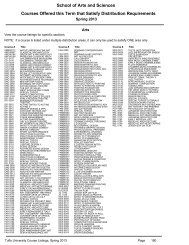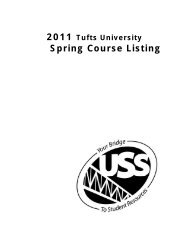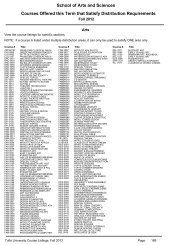2013â2014 The Bulletin - USS at Tufts - Tufts University
2013â2014 The Bulletin - USS at Tufts - Tufts University
2013â2014 The Bulletin - USS at Tufts - Tufts University
Create successful ePaper yourself
Turn your PDF publications into a flip-book with our unique Google optimized e-Paper software.
Engineering Psychology/Human fActors Engineering ><br />
Engineering Psychology/<br />
Human Factors Engineering<br />
Acting DIRECTOR:<br />
Professor of the Practice Daniel J. Hannon, Mechanical<br />
Engineering<br />
UNDERGRADUATE ADVISOR FOR LIBERAL ARTS:<br />
Professor Holly Taylor, Psychology<br />
AFFILIATED FACULTY:<br />
Professor of the Practice Daniel J. Hannon, Mechanical<br />
Engineering<br />
Professor Holly Taylor, Psychology<br />
An interdisciplinary program offered jointly by the<br />
departments of mechanical engineering and<br />
psychology.<br />
Engineering psychology, more commonly called<br />
human factors, applies knowledge of human<br />
behavior and <strong>at</strong>tributes to the design of products,<br />
equipment, machines, and large-scale systems for<br />
human use. Areas of applic<strong>at</strong>ion include medical<br />
devices and systems design, transport<strong>at</strong>ion safety,<br />
consumer product design, computer interface<br />
design, etc. Students in the School of Engineering<br />
or the College of Liberal Arts will receive the<br />
Bachelor of Science degree from their respective<br />
colleges after meeting the general requirements set<br />
by each college.<br />
<strong>The</strong> program prepares students for professional<br />
work and further gradu<strong>at</strong>e studies in this discipline.<br />
It also serves as a prepar<strong>at</strong>ion for premedical and<br />
pre-dental students; and for those interested in<br />
careers in technology design and development, or<br />
management.<br />
UNDERGRADUATE concentrATION<br />
REQUIREMENTS<br />
<strong>The</strong> program fe<strong>at</strong>ures a common set of fourteen<br />
courses divided into introductory and core course<br />
requirements. For engineering students, an<br />
additional twenty-two courses are required for the<br />
bachelor of science degree (see School of Engineering<br />
inform<strong>at</strong>ion). For liberal arts students, an<br />
additional twenty courses are required to meet the<br />
found<strong>at</strong>ion and distribution requirements for the<br />
bachelor of science degree (see College of Liberal<br />
Arts inform<strong>at</strong>ion). <strong>The</strong> core courses can be used by<br />
these students to meet the social and n<strong>at</strong>ural science<br />
distribution requirements (see the online bulletin<br />
for course descriptions).<br />
Introductory Course Requirements:<br />
Engineering Science 2 Introduction to Computing in<br />
Engineering (1 credit)<br />
Engineering Science 18 Computer-aided Design with Lab<br />
(1 credit) - (required for College of Liberal Arts), or<br />
Engineering Science 93 Special Topics in Engineering (1<br />
credit) - (required for School of Engineering)<br />
Psychology 1* or Psychology 9 Introduction to<br />
Psychology or Introduction to Cognitive and Brain Sciences<br />
Computer Science 11 or Physics 11 Introduction to<br />
Computer Science or General Physics I<br />
Computer Science 15 or M<strong>at</strong>h 32 or M<strong>at</strong>h 61 D<strong>at</strong>a<br />
Structures or Calculus I or Discrete M<strong>at</strong>h<br />
*Only Psychology 1 is approved for students in the School<br />
of Engineering.<br />
Core Course Requirements:<br />
Engineering Psychology 61 Introduction to Human<br />
Factors and Ergonomics<br />
Engineering Psychology 120 Project Study in Human<br />
Systems (year-long capstone course)<br />
Engineering Psychology 161 Human Factors in Product<br />
Design<br />
Engineering Psychology 162 Human-Machine System<br />
Design<br />
Psychology 17 Industrial and Organiz<strong>at</strong>ional Psychology<br />
Psychology 31 Behavioral St<strong>at</strong>istics<br />
Psychology 32 Experimental Psychology<br />
Psychology 53 Engineering Psychology<br />
Psychology 130 Advanced Engineering Psychology<br />
Psychology elective<br />
<strong>The</strong> list of Psychology electives for this concentr<strong>at</strong>ion<br />
can be found <strong>at</strong> http://ase.tufts.edu/<br />
psychology/undergradConcEngPsych.htm. In<br />
addition to these courses, it is recommended th<strong>at</strong><br />
students in the College of Liberal Arts consider<br />
taking the following courses with particular<br />
relevance to the field of Engineering Psychology:<br />
Engineering Science 5, Psychology 107, Computer<br />
Science 15, Computer Science 086 or 171, and<br />
Engineering Psychology 166.<br />
Students enrolled in the School of Engineering<br />
must also s<strong>at</strong>isfy the following distribution requirements<br />
for the Engineering Psychology Program:<br />
M<strong>at</strong>hem<strong>at</strong>ics 32 and 36, Engineering Science 3 or<br />
5, Engineering Psychology 166, Computer Science<br />
15 and 171, Mechanical Engineering 108 or<br />
Psychology 31, English 1 or 3, Psychology 107,<br />
176


